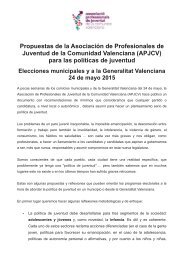c39dc
c39dc
c39dc
You also want an ePaper? Increase the reach of your titles
YUMPU automatically turns print PDFs into web optimized ePapers that Google loves.
The OECD has also recently emphasised the importance of nonformal<br />
learning in a major research project that identifies different<br />
types of benefits from its recognition: a) economic, by reducing the<br />
direct and opportunity costs of formal learning and allowing human<br />
capital to be used more productively; b) educational, by allowing<br />
people to complete formal education more quickly, efficiently and<br />
cheaply as they do not have to enrol in courses for which they<br />
already mastered the content, thus underpinning their motivation and<br />
enhancing lifelong learning; c) social, by improving equity and<br />
strengthening access to both further education and the labour market<br />
for disadvantaged group, disaffected youth and older workers; and,<br />
c) psychological, by making individuals aware of their capabilities and<br />
validating their worth. However, this research also concludes that<br />
recognition of non-formal and informal learning is still marginal and<br />
its procedures require improvement 56 . The OECD skills strategy 57<br />
has also clearly underlined the importance of non-formal learning.<br />
The strategy, which aims to transform skills into better jobs and<br />
better lives, argues that compared to purely government designed<br />
curricula taught exclusively in schools, learning in non-formal settings<br />
allows young people to develop ‘hard skills’ on modern equipment<br />
and ‘soft skills’ such as negotiations, communication and teamwork<br />
skills 58 . In their response to this strategy, business leaders, such as<br />
Business NZ, have stressed the importance of soft skills to<br />
employers and have made a strong case for the development of such<br />
skills in today’s global labour markets 59 .<br />
The Council of Europe and the European Union<br />
The Council of Europe has a strong commitment to non-formal<br />
education and has been working in partnership with various<br />
international institutions and youth organisations in this area. Its<br />
Directorate of Youth and Sports, supports the development of youth<br />
associations, networks and initiatives and promotes international<br />
cooperation in the youth field. The Council’s youth sector’s priorities<br />
for 2010-2012 have been focused on the development of European<br />
Youth cooperation through youth policy, youth work and non-formal<br />
education/ training, in line with its overall youth policy: ‘Agenda<br />
2020’ 60 , adopted in 2008. This Agenda was followed-up by the<br />
Resolution of the Committee of Ministers, also in 2008, which stated<br />
that recognition of non-formal learning plays a crucial role for social<br />
inclusion through ensuring young people’s access to education,<br />
56 OECD (2010) Recognising non-formal and informal learning: outcomes, policies and practices. OECD, Paris.<br />
57 OECD (2012) Better skills, better jobs, better lives. A strategic approach to skills policies. OECD, Paris.<br />
58 Schleicher, A. (2012) It all starts with building the right skills May, 21 st OECD Educationtoday, Paris.<br />
59 OECD (2012) Erasing the ‘bright red dividing light’ between education and work. June, 04 th , OECD<br />
Educationtoday, Paris.<br />
60 “The future of the Council of Europe’s youth sector: Agenda 2020” – Background document prepared by the<br />
secretariat of the Directorate for Youth and Sport, October 2008.<br />
23




